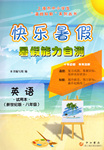题目内容
Forests help to keep water from running away, ________ drought does not often happen.
[ ]

 快乐暑假暑假能力自测中西书局系列答案
快乐暑假暑假能力自测中西书局系列答案Every month, junior high schools in China choose one hero of the month. This person is a hero because he or she has done something to help protect animals in danger. Huang Jing decided to write a letter to the President of China.


|
Dear Mr. President, I have been doing a project at school recently about animals in danger. I think the situation all over the world is really terrible. I am writing to you to suggest what China should do to help protect animals more. I know that there are nearly 2,000 nature reserves in China, which is good. I live in Beijing and there are about 30 reserves outside the city. We visited one of them last month to see for ourselves. I feel so sorry for the giant panda. It’s one of the most popular animals in the world and a real symbol of China. We learned that pandas mainly live on bamboo, and that a panda can eat half its body weight of bamboo in 24 hours! That’s a lot of bamboo. I think we should try to do more to stop cutting down forests. Pandas are already a rare animal and it would be so sad if they became extinct (灭绝) forever. The other animal we should try to protect more is the Chinese alligator (扬子鳄). These creatures live in some parts of eastern China. These beautiful animals live in freshwater rivers and lakes but the water in some places isn’t clean enough for them to live in. It’s really dirty in fact. The government should stop factories polluting the lakes and rivers. If we protect these beautiful animals in China, more foreigners may wish to visit China to see them. They could be an important tourist attraction. It would be good if more people came to visit our beautiful country, especially to see the quieter areas in the country. Now most visitors just see the cities. I hope you will encourage more people to think about such an important subject. Sincerely yours, Huang Jing |
1.What’s Huang Jing’s project at school about?
2.What animals did Huang Jing talk about in his letter?
3.How much bamboo can a panda eat in 24 hours?
4.Why is the water in some places too dirty for alligators to live in?
5.If you are a hero of the month like Huang Jing, what else will you possibly do to help protect the animals in danger? (请自拟一句话回答)
| 阅读理解。 | ||
of nature. Then he was sent to study in Cambridge University. There he studied until 1831. Some time later he heard that the ship Beagle was going on a trip to South America and wanted a scientist. His teacher advised him to go. So when the Beagle left England in December, 1831, Darwin was on it. The trip lasted almost five years. Darwin saw many new plants and animals. He collected all kinds of plants. In 1842 Darwin went to live in Kent, and there he continued his studies of change in nature. Darwin understood that plants and animals are not always the same, and that they really change. By 1859 Darwin had finished his famous book "The Origin of Species". In 1871 Darwin wrote another important book. Darwin continued his studies in science until he died in 1882. | ||
| 1. Where was Darwin born? | ||
| A. In Germany. B. In France. C. In England. D. In America. | ||
| 2. What kind of books did Darwin like reading when he was a boy? | ||
| A. Science books. B. Chemistry books. C. History books. D. Medical books. | ||
| 3. What did Darwin work as on the ship Beagle? | ||
| A. A tourist. B. A doctor. C. A waiter. D. A scientist. | ||
| 4. Which book was written by Darwin in 1871? | ||
| A. The Origin of Species. B. The Theory of Relativity. C. The Theory of Evolution. D. The Old Man and the Sea. |


